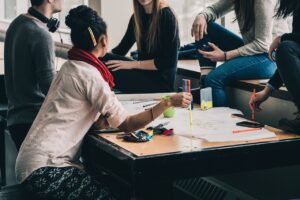News
![]()
In-person Network meeting, 19 June, Guildford
![]()

Join us on 19 June in Guildford to hear what the SLD Network’s has been up to across its five working groups and its partnering and engagement activities.
Our meeting takes place at the University of Surrey on the afternoon prior to the British Dyslexia Association conference which many Network people will be attending. We hope to add value to members’ participation in that event by bringing as many as possible together to make and refresh connections, share updates on new and ongoing work, get heads together on potential partnerships and future collaboration and to report back on work that the Network has delivered or kicked off to date. There has been a lot going on and – as anticipated when SLDN was launched – myriad opportunities to align, interact, complement and augment work happening or in prospect in different parts of the SLD landscape.
The programme will feature – among other things – updates on ongoing SLDN activity, activity in small groups to facilitate information sharing and partnering, and general discussion across perspectives from different parts of the SLD sector, all with a view of producing the greatest amount of high-impact progress as possible on all fronts.
It’s a rare thing to be able to bring so many of our peers and colleagues together in person to re-establish and deepen connections so we hope that will encourage and motivate you to add this meeting to your plans for that week.
Registration will open on 21 March and invitations to sign up will be sent out to all Network members.
Informing SLDN research priorities with Lived Experience
![]()

The Specific Learning Difficulties Network was set up to accelerate and coordinate research efforts around the UK into dyslexia, dyscalculia and dysgraphia. In October, the project conducted workshops and interviews with people diagnosed with a specific learning difficulty to help prioritise areas of study. Specialist educators, parents, community leaders and people with SLDs provided their insights, and later their feedback, on particular research questions the SLDN can use to develop research plans and grants.
The two-phase, co-produced study collected stakeholders’ initial feedback, insights and lived experience across four established themes. This was shared with SLDN researchers, who then transformed the prioritised themes into research questions. These research questions were returned to stakeholders to gain final feedback and embed the co-productive and iterative approach.
Stakeholders’ top research priority is understanding the knowledge and skills education professionals require to identify early signs of learning difficulties and provide optimal support for people affected. This includes work to understand and optimise educational interventions and environments at each age and stage, helping those with SLDs achieve the best possible outcomes.
An interesting view from consultees was that examining non-academic interests and hobbies that children with SLD tend to like could aid understanding of the conditions and, in turn, how to mitigate and overcome their negative impacts.
The effectiveness/efficacy of technologies and apps for dyslexia or dyscalculia is another area that stakeholders feel merits urgent study. This includes how technologies can best be designed and applied to help people overcome their difficulties. For example, what makes the MONZO app easier to use than the HSBC app for dyscalculics?
Dyscalculia is significantly less recognised and accommodated than dyslexia despite it affecting around one in fifteen people (6%). Dyscalculics and others said work was needed to examine the daily difficulties dyscalculics face and the impacts on life skills and concerns like financial literacy and exposure to financial abuse.
Lastly, investigating the types of employment people with SLDs go into and the barriers that exist across the spectrum of work types and roles could yield insight into the impacts, strengths and areas of potential or difficulty associated with the conditions.
This co-produced list of research questions will be used to guide research plans and funding applications over the next few years.
This short video gives a flavour of the network’s first public event on 16 June at the Royal Society of Edinburgh. Like the event itself, the video introduces SLDN’s work to raise awareness of dyslexia and dyscalculia.
As well as a focus group session for teachers, the day featured an exhibition area showcasing different organisations including Dyslexia Scotland and CALL Scotland, giving attendees an opportunity to ask questions, learn about current work around Scotland, and to network. Prof Brian Butterworth (UCL) then delivered a fascinating talk on recent developments in the science of dyscalculia which was a revelation to much of the audience. A short panel discussion closed the event, with perspectives from Education Scotland and inspiring contributions from two Young Ambassadors from Dyslexia Scotland.
A video of the full lecture and panel discussion is available here.
